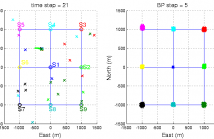
- Read more about CONSENSUS AND MULTIPLEX APPROACH FOR COMMUNITY DETECTION IN ATTRIBUTED NETWORKS
- Log in to post comments
An attributed network has nodes with attribute vectors. For community detection on an attributed network, we exploit the attributes to disentangle the potentially mixed topological structures. We describe a multiplex representation scheme for overlapping community detection in attributed networks and find consensus communities across layers of different connection structures. We test the method on Twitter, Facebook and Google+ networks and the results are comparable to state of the art. We show that the use of attribute vectors improves detection accuracy.
poster.pdf
- Categories:
 10 Views
10 Views
- Read more about A New Perspective on Randomized Gossip Algorithms
- Log in to post comments
In this short note we propose a new approach for the design and analysis of randomized gossip algorithms which can be used to solve the average consensus problem. We show how the Randomized Block Kaczmarz (RBK) method—a method for solving linear systems—works as gossip algorithm when applied to a special system encoding the underlying network. The famous pairwise gossip algorithm arises as a special case.
- Categories:
 14 Views
14 Views
- Read more about GREEDY APPROACHES TO FINDING A SPARSE COVER IN A SENSOR NETWORK WITHOUT LOCATION INFORMATION
- Log in to post comments
Modeling a location-unaware sensor network as a simplicial complex, where simplices correspond to cliques in the communication graph, has proven useful for solving a number of coverage problems under certain conditions using algebraic topology. Several approaches to finding a sparse cover for a fenced sensor network are considered, including calculating homology changes locally, strong collapsing, and Euler characteristic collapsing.
- Categories:
 7 Views
7 Views
- Read more about A Spectral Graph Wiener Filter in Graph Fourier Domain for Improved Image Denoising
- Log in to post comments
A Wiener filtering scheme in graph Fourier domain is proposed for
improving image denoising performance achieved by various spectral
graph based denoising methods. The proposed Wiener filter is
estimated by using graph Fourier coefficients of the noisy image after
they are processed for denoising, to further improve the already
achieved denoising accuracy as a post-processing step. It can be estimated
from and applied to the entire image, or can be used patchwise
in a locally adaptive manner. Our results indicate that the proposed
- Categories:
 16 Views
16 Views
- Read more about Distributed Estimation of Latent Parameters in State Space Models Using Separable Likelihoods
- Log in to post comments
This work is a part of our research on scalable and/or distributed fusion and sensor calibration. We address parameter estimation in multi-sensor state space models which underpins surveillance applications with sensor networks. The parameter likelihood of the problem involves centralised Bayesian filtering of multi-sensor data, which lacks scalability with the number of sensors and induces a large communication load. We propose separable likelihoods which approximate the centralised likelihood with single sensor filtering terms.
- Categories:
 11 Views
11 Views